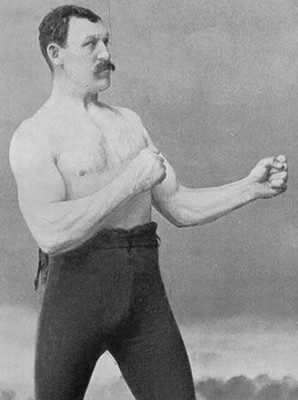60 pounds and 8 inches.
That's how much weight and girth around my waist I have shed in the last 15 months. I have gone from a 42-inch waist back down to a 34" waist and I have gone from 265 lbs down to just under 205 today -- while adding a significant amount of muscle mass. And I did so with a fairly relaxed workout routine.
I had gotten fat and what was worse (for me) was that my mental edge and sharpness, as well as my motivation, were dulled and muted. All of that has changed radically in the last 14 - 16 months.
How did I do it? What was the major or primary shift? There were certain things that helped: I eliminated sugars and all grain-based carbohydrates except for the ever-famous "cheat day" once a week. That certainly helped. Ten months ago I chose to stop consuming alcohol -- choosing clarity over self-indulgence. Yes, that has assisted in the process.
But the primary component? Testosterone. Testosterone manages a lot of things: libido and aggression get all the press, but did you know it also impacts drive and motivation, cognitive edge/sharpness, and fat metabolism/retention?
And mood.
Oh, mood.
And even more sadly (no pun intended) many men are being misdiagnosed with clinical depression when they really just have low testosterone levels.
Most people don't realize it, but if you have low testosterone levels you will retain fat--and it will increase your estrogen levels, which then, in turn, has you retain even more fat, which in turn lowers your testosterone even further -- it becomes a hormonal downward spiral.
And here is the kicker: a medical practitioner will often tell a man with very low testosterone that it is "normal" if it is still in the normal range. The range being between 200 and 1100.
200 might be "normal" but it is certainly not optimal.
Disclaimer: I am not a trainer, nutritionist, medical Dr, or practitioner of any kind of medicine nor do I hold myself out as such. I am simply a guy who has done a lot of research on my own and experimented with certain supplements and herbs and gotten my blood tested 4 times in the last year at regular intervals--and I am reporting my findings here for those who want to do their own research.
Let's discuss testosterone, free testosterone, levels, dietary adjustments, and most important of all, supplementation. Henceforth, testosterone will be simply referred to as "T" and free testosterone as "Free T".
Distinctions, Levels, and Ranges
Total T is what most people get measured with the blood tests that are out there--and if your Dr is not a specialist, this is the test they will give you unless you request both Total T and Free T to be tested.
Total T is just what it sounds like: your total levels in your blood. Free T is a test to see how much is bio-available; how much of your T is floating around available to be put to use at any given moment.
What is a "normal" range? Depends on which lab you ask, but there is some overlap. Some labs will say that a "normal" Total T level is between 200 and 1,300 ng/dl (nanograms per deciliter). Others say it is between 300 and 1300. The normal range for Free T is murkier because of the different tests that different laboratories use. Here is a set of ranges from a forum I was involved in for a while:
Consequently, if your doctor tests your free testosterone, be sure you know the analytical method used. If your test results have a reference range as follows, you have probably been tested with one of the other test methods:

